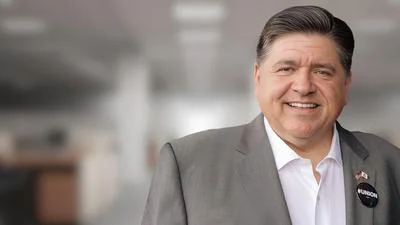Illinois Policy Institute CEO John Tillman said voters in the state will likely reject the graduated income tax amendment added to the November 2020 ballot.
Gov. J.B. Pritzker campaigned on a tax system overhaul, known as the “fair tax,” which earned a spot on the ballot after the Democratic majority in the Illinois House of Representatives voted 73-44 to advance the bill.
The 44 Republicans in the house voted against the bill, Senate Joint Resolution Constitutional Amendment 1.

Illinois Policy Institute CEO John Tillman
Tillman said legislators used Memorial Day weekend to mask advancement of a bill that has garnered “extraordinary backlash” from taxpayers.
“Vocal opposition, as well as statewide and in-district polling, shows state lawmakers have chosen to turn their backs on their constituents,” Tillman said.
Constituents filed nearly 10,000 witness slips opposing the bill, with approximately 4,000 slips in support.
Tillman said approximately 12,500 residents opposed to the bill have called legislators, along with “tens of thousands of petitions signatures and emails” against the tax.
He predicted the Illinois tax amendment would meet a similar fate as a Colorado amendment rejected by voters in 2018.
The proposed tax reform in Colorado would have raised taxes on those with incomes exceeding $150,000, along with a rise in the corporate income tax rate.
It received 46 percent of the vote, missing the 55 percent threshold required to pass the amendment.
Illinois legislators have yet to pass a bill containing new tax rates in the event of the amendment’s success.
It is not clear how many Illinois voters must vote yes in 2020 to pass the amendment. The threshold may be determined by the amount of voters who cast ballots but do not vote on the amendment, according to the site Illinois Election Data.
If this figure — known as the dropoff rate — is 1 percent, then the amendment could pass with 50.52 percent of voter support. If the dropoff rate is 16 percent, however, the amendment needs 59.54 percent of voters in favor.
Tillman said lawmakers have a habit of voting on tax hikes during holiday weekends, citing a 2017 tax raising measure advanced during Fourth of July weekend.
“The fact that state lawmakers blew through internal deadlines to pass this amendment in late May – when voters weren’t watching – speaks volumes about their confidence in the plan,” Tillman said.
Republican lawmakers have spoken out against the proposal since its early stages and continue to heavily contest it as a ballot item.
Illinois House Republican Leader Jim Durkin (R-Western Springs) said after the amendment was added to the ballot that the state’s Democratic party has controlled finances to the detriment of residents for the past 30 years.
“The House Republicans will continue to stand united against the majority party’s insatiable desire for higher taxes that has caused businesses and families to flee the state in droves,” Durkin said.
Durkin is among several Republican lawmakers who have vocally opposed the tax, including Illinois Republican Party Chairman Tim Schneider.
On the other side of the aisle, Democrats celebrated the bill’s advancement. House Speaker Michael J. Madigan (D-Chicago), said the tax will build a stronger middle class.
Gov. Pritzker lauded the proposed amendment as “fair tax legislation making the wealthy pay their fair share while 97 percent of taxpayers pay the same or less.”
“Opponents should be honest that they offer bad options - either cutting schools and public safety to the bone, or raising taxes on everyone by 20 percent,” Pritzker said. “Instead, I stand firmly on the side of working families and fairness."






 Alerts Sign-up
Alerts Sign-up